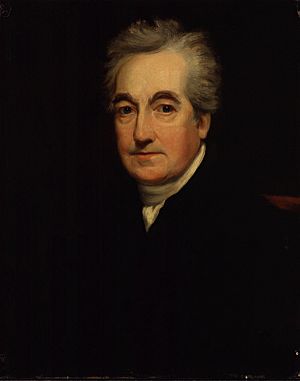Joseph Shepherd Munden facts for kids

Joseph Shepherd Munden (born 1758 – died 6 February 1832) was a well-known English actor. He was especially famous for his funny roles.
Before becoming a star in London, he worked for many years in theaters outside the city. He was both an actor and a manager. His first big performance in London was in 1790 at the Covent Garden theatre. He stayed there for a long time, until 1811, and became a top comedian. Later, in 1813, he also performed at the Drury Lane theatre. He stopped acting in 1824.
Contents
Early Life and First Steps in Acting
Joseph Munden grew up in Holborn, London. His father was a poulterer, someone who sells chickens and other birds. When he was young, Joseph ran away from home to join a group of traveling actors.
- He worked in an apothecary's shop when he was about twelve.
- Later, he became an apprentice to a law stationer.
- In Liverpool, he worked in a town clerk's office for a while.
- He also appeared on stage there as an extra.
After gaining experience with different acting groups, Munden got a job playing older characters in Leatherhead. He started to become noticed in Canterbury around 1780. He played the first Faddle in a play called The Oaks, or the Beauties of Canterbury. He then joined a well-known acting company in Chester and toured around the country. Munden even managed to borrow money to buy a share in managing some northern theaters. Here, he played the main funny roles and became very famous and successful.
On 20 October 1789, he married Frances Butler in Chester. She was an actress in the same company and stopped acting after they got married.
Becoming a Star at Covent Garden
After a famous actor named John Edwin passed away in 1790, Joseph Munden was asked to join the Covent Garden Theatre. He sold his share in the smaller theaters and moved to London with his wife.
- On 2 December 1790, he made his first London appearance.
- He played Sir Francis Gripe in The Busy Body.
- He also played Jemmy Jumps in The Farmer.
- He was very well received by the audience.
Munden stayed at Covent Garden until 1811. Sometimes, he would perform at the Haymarket Theatre in the summers. He also traveled to other parts of the country to act. During this time, he slowly became known as the most celebrated comedian of his era.
- On 4 February 1791, he was the first Sir Samuel Sheepy in School for Arrogance.
- On 14 March, he was the first Frank in Modern Antiques.
- On 16 April, he was the first Ephraim Smooth in Wild Oats.
Munden played hundreds of different characters. He took on main roles in plays by famous writers like George Colman, Thomas Morton, and Frederick Reynolds. His role as Old Dornton in Road to Ruin in 1792 was a huge hit. It remained one of his most loved roles throughout his career.
- At the Haymarket, on 15 July 1797, he was the first Zekiel Homespun in The Heir at Law.
- At Covent Garden, on 12 January 1799, he was Oakworth in Votary of Wealth.
- On 8 February 1800, he was Sir Abel Handy in Speed the Plough.
- On 1 May 1800, he was Dominique in Paul and Virginia.
Around 1800, there was a disagreement between the main actors of Covent Garden and the manager, Thomas Harris. Munden was one of the actors who signed a complaint. However, the lord chamberlain, who was the judge, did not agree with the actors. After this, Munden visited Dublin, Birmingham, and Chester to perform. In 1802, Munden rented a house in Dartmouth Park, London. He lived there until 1819.
In 1811, Munden had a disagreement with the theater management about money. He left Covent Garden and did not return, except for one special performance. He played at the Haymarket Theatre in 1811 and 1812. However, for two years, from 1811 to 1813, he mostly performed in other cities. He acted in Edinburgh, Newcastle, Manchester, and other places. He earned a lot of money during this time.
Drury Lane and Retirement
On 4 October 1813, Joseph Munden started performing at Drury Lane theatre. His first role there was Sir Abel Handy in Speed the Plough. On 11 March 1815, he created one of his most famous characters, Dozey. Dozey was an old sailor in a play called Past Ten o'Clock and a Rainy Night.
- On 14 December 1815, he played Vandunke in The Merchant of Bruges.
- At Drury Lane, he played fewer new important roles.
- His last new role was General Van in Veteran, or the Farmer's Sons in 1822.
Munden's health was not good. He said goodbye to the stage on 31 May 1824. For his farewell performance, he played Sir Robert Bramble and Old Dozey. He also gave a special speech to the audience.
After he retired, Munden mostly stayed at home. His wife took care of him. He passed away on 6 February 1832 in London. He was buried in the vaults of St George's, Bloomsbury church.
Family Life
Joseph Munden had several children. His son, Thomas Shepherd Munden, wrote a book about his father's life. Thomas passed away in July 1850 when he was 50 years old.
 | Janet Taylor Pickett |
 | Synthia Saint James |
 | Howardena Pindell |
 | Faith Ringgold |

